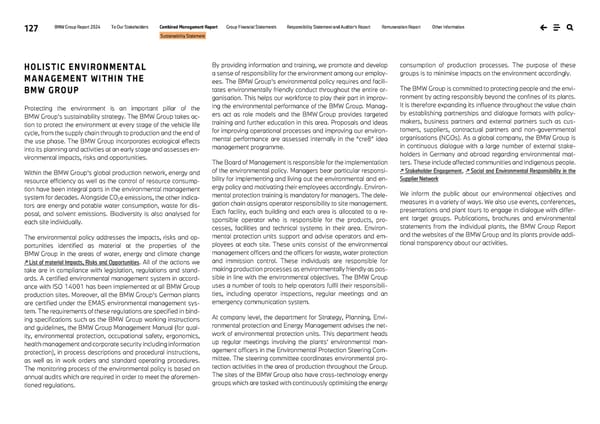127 BMW Group Report 2024 To Our Stakeholders Combined Management Report Group Financial Statements Responsibility Statement and Auditor’s Report Remuneration Report Other Information Sustainability Statement HOLISTIC ENVIRONMENTAL MANAGEMENT WITHIN THE BMW GROUP Protecting the environment is an important pillar of the BMW Group’s sustainability strategy. The BMW Group takes ac- tion to protect the environment at every stage of the vehicle life cycle, from the supply chain through to production and the end of the use phase. The BMW Group incorporates ecological effects into its planning and activities at an early stage and assesses en- vironmental impacts, risks and opportunities. Within the BMW Group’s global production network, energy and resource efficiency as well as the control of resource consump- tion have been integral parts in the environmental management system for decades. Alongside CO2e emissions, the other indica- tors are energy and potable water consumption, waste for dis- posal, and solvent emissions. Biodiversity is also analysed for each site individually. The environmental policy addresses the impacts, risks and op- portunities identified as material at the properties of the BMW Group in the areas of water, energy and climate change ↗ List of material Impacts, Risks and Opportunities. All of the actions we take are in compliance with legislation, regulations and stand- ards. A certified environmental management system in accord- ance with ISO 14001 has been implemented at all BMW Group production sites. Moreover, all the BMW Group’s German plants are certified under the EMAS environmental management sys- tem. The requirements of these regulations are specified in bind- ing specifications such as the BMW Group working instructions and guidelines, the BMW Group Management Manual (for qual- ity, environmental protection, occupational safety, ergonomics, health management and corporate security including information protection), in process descriptions and procedural instructions, as well as in work orders and standard operating procedures. The monitoring process of the environmental policy is based on annual audits which are required in order to meet the aforemen- tioned regulations. By providing information and training, we promote and develop a sense of responsibility for the environment among our employ- ees. The BMW Group’s environmental policy requires and facili- tates environmentally friendly conduct throughout the entire or- ganisation. This helps our workforce to play their part in improv- ing the environmental performance of the BMW Group. Manag- ers act as role models and the BMW Group provides targeted training and further education in this area. Proposals and ideas for improving operational processes and improving our environ- mental performance are assessed internally in the “cre8” idea management programme. The Board of Management is responsible for the implementation of the environmental policy. Managers bear particular responsi- bility for implementing and living out the environmental and en- ergy policy and motivating their employees accordingly. Environ- mental protection training is mandatory for managers. The dele- gation chain assigns operator responsibility to site management. Each facility, each building and each area is allocated to a re- sponsible operator who is responsible for the products, pro- cesses, facilities and technical systems in their area. Environ- mental protection units support and advise operators and em- ployees at each site. These units consist of the environmental management officers and the officers for waste, water protection and immission control. These individuals are responsible for making production processes as environmentally friendly as pos- sible in line with the environmental objectives. The BMW Group uses a number of tools to help operators fulfil their responsibili- ties, including operator inspections, regular meetings and an emergency communication system. At company level, the department for Strategy, Planning, Envi- ronmental protection and Energy Management advises the net- work of environmental protection units. This department heads up regular meetings involving the plants’ environmental man- agement officers in the Environmental Protection Steering Com- mittee. The steering committee coordinates environmental pro- tection activities in the area of production throughout the Group. The sites of the BMW Group also have cross-technology energy groups which are tasked with continuously optimising the energy consumption of production processes. The purpose of these groups is to minimise impacts on the environment accordingly. The BMW Group is committed to protecting people and the envi- ronment by acting responsibly beyond the confines of its plants. It is therefore expanding its influence throughout the value chain by establishing partnerships and dialogue formats with policy- makers, business partners and external partners such as cus- tomers, suppliers, contractual partners and non-governmental organisations (NGOs). As a global company, the BMW Group is in continuous dialogue with a large number of external stake- holders in Germany and abroad regarding environmental mat- ters. These include affected communities and indigenous people. ↗ Stakeholder Engagement, ↗ Social and Environmental Responsibility in the Supplier Network We inform the public about our environmental objectives and measures in a variety of ways. We also use events, conferences, presentations and plant tours to engage in dialogue with differ- ent target groups. Publications, brochures and environmental statements from the individual plants, the BMW Group Report and the websites of the BMW Group and its plants provide addi- tional transparency about our activities.
 BMW Group Report 2024 Page 126 Page 128
BMW Group Report 2024 Page 126 Page 128